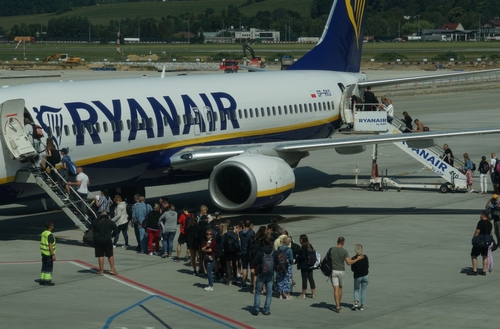
The aviation industry is currently grappling with a scandal of epic proportions. Major airlines, including American Airlines, United Airlines, and Southwest Airlines, have been forced to ground planes due to potentially catastrophic faults in thousands of jet parts.
The issue lies at the heart of the aviation industry’s safety oversight measures, raising serious questions about their effectiveness.
The controversy centers around AOG Technics, an airplane parts supplier accused of mass-producing fraudulent safety certificates to sell its engine parts to airlines.
The company has also faced allegations of fabricating employees and using stock photographs for non-existent staff on LinkedIn. Attempts to contact AOG Technics have so far been unsuccessful, further deepening the mystery surrounding the company.
Airline bosses/CEO's screamed like babies when flights had to be grounded because of COVID in 2020. They insisted we all lived with COVID.
Now we're living with it & their planes are grounded again & they blame staff for being sick. Fuck off O'Leary
1/2
@RyanairPress— Kate Pritchard (@KatePri14608408) September 28, 2023
The potentially faulty safety certificates have been found in at least 126 Boeing and Airbus engines across several airlines. The range of affected parts spans from small nuts and bolts to crucial turbine blades, highlighting the potential severity of the situation.
The most impacted engine model is the CFM56, which holds the record for the most engines ever sold to airlines at over 33,900. This engine is currently installed in numerous jets worldwide, including Boeing’s predecessor to the 737 MAX and the initial version of the Airbus A320.
The scandal has prompted a lawsuit by General Electric (GE) and Safran, who were alerted to the crisis by the engineering and maintenance teams of TAP Air Portugal.
They allege that AOG Technics’ actions have put aircraft safety in jeopardy and made it impossible for operators who purchased these parts to verify the airworthiness of their engines. Despite the ongoing legal battle, GE assured investors that it does not anticipate any financial impact from the issue.
The scandal has also shed light on the complex nature of the aviation industry. AOG Technics, established in 2015, serves as a middleman in the industry, acquiring parts before selling them to maintenance and repair shops.
The sky is being blitzed again this evening. What should the punishment be for these chemtrail sprayers? Prison would be too lenient. 😠 pic.twitter.com/0VHA0ZxveE
— wish you were here. (@joanybaby77) October 3, 2023
However, there is reportedly no record of the company ever receiving approvals for its parts, raising further concerns about its operations.
In the UK, where AOG Technics lists its address, a judge has ordered the company to turn over its parts sales documents.
The full extent of the scandal could grow as these records are assessed. Before the analysis began, airlines reported finding 16 engines in their shops and 110 in separate facilities fitted with parts from AOG Technics.
The aviation industry’s current crisis underscores the importance of stringent safety measures and the potential consequences of their failure. As investigations continue, the industry must take swift action to ensure passenger safety and restore public trust.










